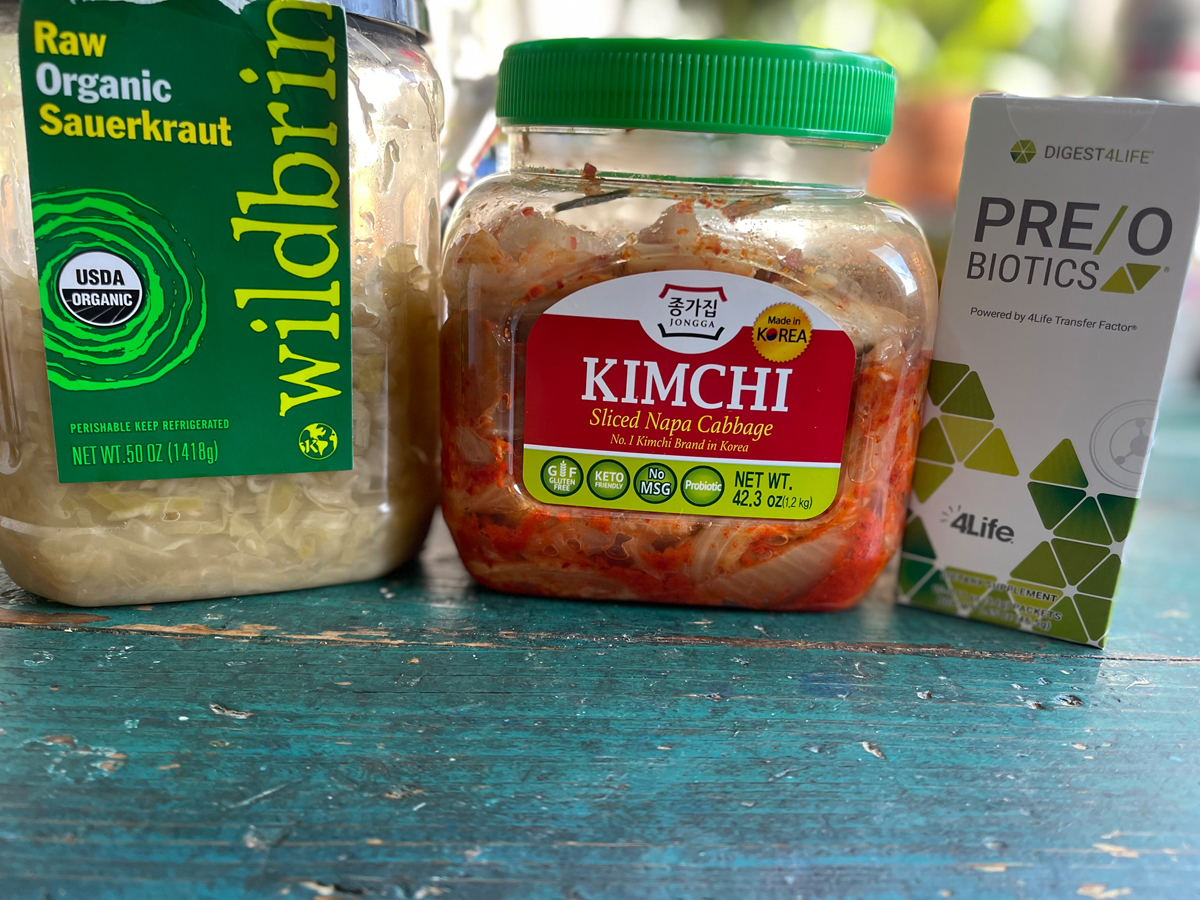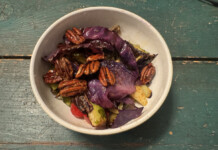By Heather Casey — Did you know that diverse bacteria in the gut are responsible for 70% of the body’s immune function? “A whopping 70%, says David Heber, MD, Ph.D., professor emeritus of medicine at UCLA Health. He further adds that nutrition is “a key modulator of immune function.”
When this microbiome achieves balance with good bacteria, it can boost your immunity and support your emotional well-being. Your diet contributes to your mood and keeps your gut microbes happy or sad. You choose! To help you treat your gut better, here are five ways you can improve your gut health and immunity.

1. Have a field day with plant-based foods
Fruits and vegetables are beautiful on your plate but also crucial as diverse sources of fiber! Many fruits and vegetables are rich in microbiota-accessible carbohydrates (MACs), and they set the stage for diverse microbial populations in the gut. Our bodies’ superheroes are dietary fiber, gut microbes, and the gut mucosal barrier. They all work together to defeat the bad guys (pathogens) in your gut. You’ll keep these superheroes strong with a diet of varying fiber sources! If your diet lacks fiber, significant amounts of beneficial bacteria are lost, and their health benefits also get sacrificed.
2. Increase Probiotics
Probiotics are microorganisms in the gut that provide health benefits for your body. Regarding immunity, some probiotics increase lymphocytes (white blood cells) that protect against infection and inflammation. Other probiotics speed up healing from ailments while minimizing inflammation-associated tissue damage in the body. You can find probiotics in kimchi, kombucha, and other dietary supplements. These foods and supplements are an excellent way to check in with your bio-individuality! Not everyone can tolerate probiotic-rich foods (hello, bloating!), and they’re also not advisable if you experience immunosuppression or have histamine intolerance.
If you can incorporate probiotics into your routine, slowly add them to your diet. Discuss probiotic supplementation with your healthcare provider first (especially if you have gastrointestinal issues).
How to introduce more probiotics into your meals:
-
- Substitute yogurt or kefir with “live active cultures” in your cereal, oatmeal, or smoothies instead of milk.
- Fermented vegetables such as sauerkraut or kimchi are a flavorful condiment and a fun side dish.
- Choose naturally fermented pickles instead of vinegar pickles when making tuna salad, sandwiches, and burgers.
3. Pile on Prebiotics
Once you’ve added probiotics to your diet, you’ll need plenty of prebiotics to help your gut flourish. Prebiotics are different from probiotics as they are the non-digestible food ingredients that “feed” the probiotics.
Let’s liken the microbiome to a garden; the flowers are the probiotics, while the fertilizer, water, and sunlight that help the flowers blossom are the prebiotics. By assisting probiotics to “grow,” prebiotics ultimately determine the gut’s bacterial composition. Prebiotics also generate short-chain fatty acids (SCFAs) that regulate the immune system by positively affecting the surrounding immune cells. Just like probiotics, not everyone can tolerate prebiotics well. Some people (including those with IBS) are sensitive to them, so starting with small portions of prebiotic-rich foods can be crucial to estimating your prebiotics’ tolerance.
How to incorporate prebiotics into your diet:
-
- Cashews, pistachios, apricots, dates, figs, and watermelons are just a few of my favorite nuts and fruits with prebiotic-rich fibers.
- Swap out one meat-based meal weekly for a plant-based meal made with garlic, onions, and legumes. They are all great sources of prebiotics.
- Love tea? Sip on a teacup of chicory root or fennel tea to have that sweet kick of prebiotics!
4. Lessen your stress levels
Stress can contribute to several gastrointestinal issues, but did you know that stress directly impacts the gut microbes in your body, too? Stress may lead to inflammation by reducing the amount of SCFAs. If you recall, SCFAs are crucial for your immunity! Chronic stress can also affect the durability of your intestinal barrier, leading to leaky gut syndrome, a condition that increases inflammation in your body.
5. Get Dirty!
It doesn’t hurt to get dirty, and here’s why: one teaspoon of soil contains one billion beneficial microbes! Overly sanitized environments significantly decrease gut microbe diversity, which is why you should get dirty!
-
- Seek adventure hiking, trail running, and even skiing is perfect for getting dirty.
- Shift one or two of your hobbies to the outdoors.
- Dig deeper! Even if you don’t have a green thumb, potting a few plants is a great way to expose yourself to soil microbes!
Trust your gut
When your heart (or, in this case, your gut) tells you something isn’t right about your body, it can come through as an emotion, such as fear, or a physical symptom, such as gastrointestinal distress. Listen more often to what your gut tells you; perhaps you’ll begin to make choices more aligned with health, wellness, and overall immunity.
Heather Casey and her husband Pat own Peak State Fit Performance Center located in Salt Lake City, UT where they specialize in bike fitting, coaching, and nutrition services. Heather is a 5 X Ironman finisher including Ironman World Championships in Hawaii. Heather’s professional experience includes NSCA, Certified Strength and Conditioning Specialist, Precision Nutrition Master level sports nutritionist, 500-hour Yoga Instructor, PNOE Metabolic Health Specialist.








